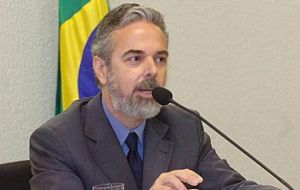MercoPress. South Atlantic News Agency
India, Brazil, Germany, Japan demand Security Council reform this year
 Brazil's Foreign Minister Antonio Patriota, targeting the widest support possible
Brazil's Foreign Minister Antonio Patriota, targeting the widest support possible Four regional powers hoping to get permanent seats on the Security Council — India, Germany, Brazil and Japan — said Friday they believe the U.N. will take action by September on expanding its most powerful body.
Despite more than 30 years of failed efforts to reform the 15-member council, ministers of the so-called Group of Four expressed optimism that “a concrete outcome” can be achieved during the current session of the 192-member U.N. General Assembly which ends in early September.
Brazil's Foreign Minister Antonio Patriota said the four countries were “testing different ideas” on enlarging the council with new permanent and non-permanent members to find a formula that will get “the widest possible acceptance — about two-thirds support.”
The four countries said in a joint statement after talks on the sidelines of a Security Council meeting that they would work with other countries in the coming weeks and months “in a spirit of flexibility” to reach agreement on a reform plan.
India's Foreign Minister S.M. Krishna told a news conference that the most important decision taken by the four countries is “to press ahead with reforms on an urgent basis.”
Japan's State Secretary for Foreign Affairs Takeaki Matsumoto added that with stepped up pressure and flexibility “we are going to reach our goal.”
Since 1979, the U.N. has been talking about expanding the council to reflect the world in the 21st century, not the global power structure after World War II when the United Nations was founded. But every proposal has been rejected, primarily because of rivalries between countries and regions more concerned about their own self-interests than the improved functioning of the U.N.
Patriota said he believes “the pressure is mounting here for members to finally address Security Council reform.” He said there is still no consensus on the size or membership of an expanded council, but he said “the sense of the four representatives here today ... is that we can reach concrete outcomes.”
The Security Council is powerful because it is responsible for maintaining international peace and security and can authorize military action and impose sanctions, so membership is coveted.
The council's five permanent members — the U.S., Russia, China, Britain and France — have veto power and their support is essential for any reform to be adopted. Its 10 non-permanent members represent all regions of the world and are elected for two-year terms.
For the first time this year, the council has a unique membership of global powers and important emerging countries that reflect the 21st century world: India and China in Asia, South Africa and Nigeria in Africa, and the biggest economic powers in Latin America and Europe, Brazil and Germany. Japan left the council in December after a two-year term.
Germany's Foreign Minister Guido Westerwelle said this membership “opens new opportunities”. He warned that “if the U.N. will not reflect the world like it is today, the authority of the U.N. will decrease”.




Top Comments
Disclaimer & comment rules-

-

-

Read all commentsCan't see China accepting Japan at any price!
Feb 12th, 2011 - 09:07 am 0as long as argentina never gets on it,
Feb 12th, 2011 - 01:30 pm 0the world will never hear the end of it .
UK & France must be packed off !!
Feb 12th, 2011 - 03:41 pm 0Commenting for this story is now closed.
If you have a Facebook account, become a fan and comment on our Facebook Page!